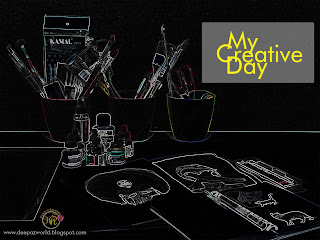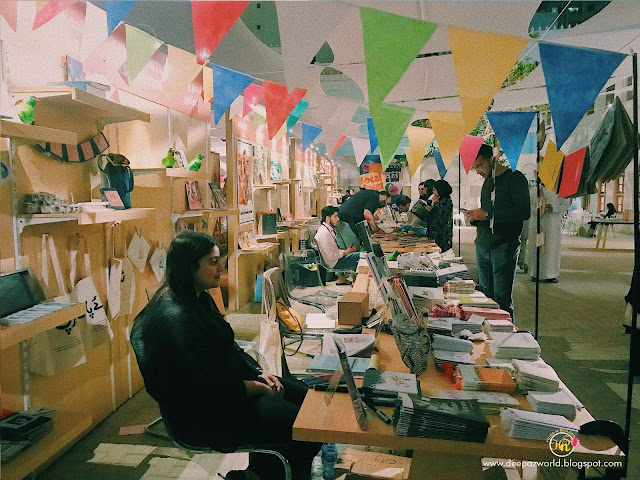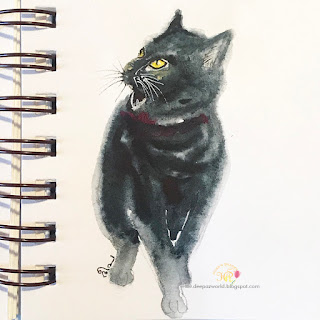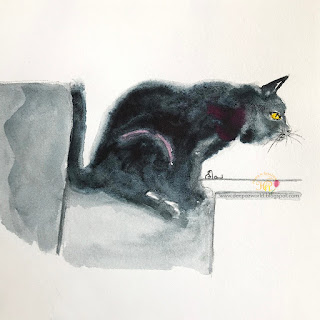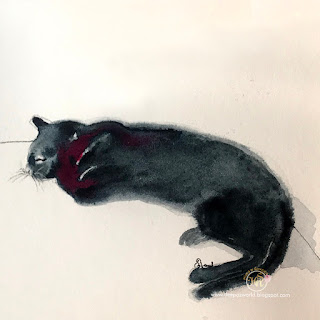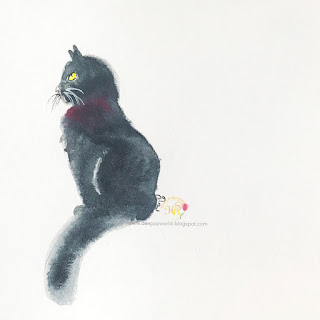How do I sum up a day that allows me
to create art? Difficult I must say, as the ‘day’ is a sum total of thousands
of days, of an unending journey of self-discovery.
My day starts with art in every form
conceivable, like planning and preparing tiffin for my daughter at 5.30 AM.
Tiffin and art? Then breakfast for my family and art? But, that’s how it is. I
believe art is everywhere and one gets to absorb from any art form. Food is
definitely one with its processes, textures and taste. It has to be healthy,
tasty, interesting and inviting, all at the same time. That’s art too. Cooking
is like meditation for me. It soothes me, helps me find a semblance of sanity
out of chaos and madness. It’s like a jugalbandi
(a duet of two
solo musicians) between food and my
chaotic artistic mind.
“…the
‘day’ is a sum total of thousands of days, of an unending journey of
self-discovery.”
Next comes exploring my home with its
lovely terrace garden, that surprises me with mother nature’s art – the flowers
and foliage in all their form, colour, glory and fragrance. Every day is a
surprise, every day holds something new. I observe them and take inspiration for
my day ahead. Do the shadow play of the leaves under the rising morning sun
tries to give me a cue to composition? I think about such things as the day
unfolds, and imbibe them. Perhaps, with the hope that they will sneak into my
paintings. But oh wait, are the works that my brushes work fervently meant to
paint or to create art? So I rummage my memories, travel back to childhood and
discover my next inspiration, my next human story that I must bring forth on my
canvas. And more importantly bring them to life, which touches souls and moves
people.
I put on the music, my old radio or
the music system. It depends, on what I am going to create that day. From Tagore
songs to Bob Dylan, I shuffle through and then listen to them with my heart.
Sometimes, I pause them to listen to a Bulbul just outside my window and join
it humming my favourite songs.
”Do the
shadow play of the leaves under the rising morning sun tries to give me a cue
to composition?”
The morning newspapers confront me with
reality, and also human stories of triumph and tribulations. A hot cup of
Darjeeling tea balances my senses, soothes my nerves and strengthens my resolve
to do my bit. As I sip the second flush muscatel, it takes me back to the
sylvan hills and the mysterious customs of the Buddhist monks, of the simple
life of the pahari (people
inhabiting the Himalayan regions of Nepal and northern India) people. I shuffle my music
list and listen to ‘Pahari’ by Pandit Bhimsen Joshi and Shiv Kumar Sharma and
suddenly the hills invade my home. I am not a very religious person, but I do
pray mostly to thank and rarely to ask.
Moving to the next, at around 9.30
AM, after all my family members have been taken care of, is when a mother, wife
and daughter-in-law is ready for the artist. My studio beckons, the paints gear
up, the brushes quiver and my canvases on easels become restless to meet me.
“My
studio beckons, the paints gear up, the brushes quiver and my canvases on
easels become restless to meet me.”
At 10 AM sharp I am at my studio. It
begins with mundane things like checking messages and mails and responding to
them. But, at times, exciting official work like responding to a studio or an
enquiry. I also scan through a few art websites to get the day’s news.
The next half an hour I dedicate myself to
read. Over the last couple of years, I have tried to build a small library of
sorts. From theatre to tribal art to textiles, and of course study material on
masters – both past and present, and both international and national. Ganesh
Pyne is one of my favourites and so is Jogen Choudhury for his bold lines. I
also like to read about Chittoprasad for his fieriness, as also Bhaijju Shyam
for his dare to dream attitude. Hockney, Sabavala, Nolde, Manida…all of them
suddenly fill my studio and sweep away the quietude. Each one inspires me,
tells me to pick up the brush and lets go off the apprehensions about
acceptance/rejection that clouds my thinking.
I then take a deep breath and look at
my canvases, brushes and paints - My time to talk to them and listen to them.
Have I failed them? Poured enough love for them? After all, they are all my
children. At times they do tell me a lot of things, their worries or even
sentiments. But in the end, our conversations end on one note – pick up the
brushes and tell your untold story, paint for the greater glory of life.
“Each
one inspires me, tells me to pick up the brush and let go off the apprehensions
about acceptance/rejection that clouds my thinking.”
And so, I pick up a conte or a
charcoal block to draw the first lines. Slowly the rhythm picks up and the line
between reality and imagination starts getting blurred. The brushes follow, then
the scalpel or maybe the syringes and tubes of color. In between, sandpapers
come and go and so are the colour pencils and ink. It’s the most satisfying
period, as I lose count of time and what is happening around; detached with the
world yet attached to my own that I have created. After a spell, I step back
and then I am my biggest critic. It depends at what stage the painting is, and
whether it satisfies me as it evolves. The next is to go back to it with double
the effort, maybe start fresh or course-correct if the painting needs so.
Till I am reminded by a gentle buzz
on my phone that it’s Lunchtime, and that 3 hours have just flown. I come back
to receive my daughter from school and listen to her day’s story until I serve
lunch to my family. The afternoon is spent reading a book, maybe a fast-paced
thriller on India’s archaeological findings or behind the scene anecdotes of
Sherlock Holmes or even short stories by Tagore. At times I find similarities
with the struggles and frustrations of the Master Painters, and at times the
laidback afternoon brightens up on finding similarities of triumph and hope
with that of my own journey. This is my recharge time for the evening shift.
“It’s
the most satisfying period, as I lose count of time and what is happening
around; detached with the world yet attached to my own that I have created.”
Evenings are spent helping my
daughter with her studies, solving Maths, explaining physics and giving her
tasks while I head for my studio again. Enroute I pick up groceries and
vegetables. And then, I am back at my studio for the next 2 hours, picking up
from where I left in the morning session. I draw the curtains and look at the
city’s night skyline, the reflection of dancing lights on the lake and soak in
the breeze. I head back home again for one of the most interesting parts of the
day – my chit chat session with my husband, friend, guide and philosopher. Till
dinner time, when the whole family comes together over the table. This is the
time our discussions veer from unusual to the most mundane of topics from films
to music to cybernetics to biotechnology to philosophy to cuisine, except
politics that is.
At 10.30 PM it’s time to listen to
the Night Jar and the whispering trees, and then the dreams take over;
preparing me for another day, for an unending journey to find myself, my true
calling.
 About the Artist: Born in 1975 Runa Biswas comes from the old side of
Kolkata, India and lived in a house that was 100 years old, surrounded by a history of 300 years. There was art everywhere, surrounding her with its many
hues, patterns, colours and smell. From a very early age, she was drawn to
art; painting whatever evoked a sense of happiness and freedom. After
procuring a Diploma in Fine Arts from Rabindra Bharati University and an
MSc in Economics from Calcutta University, she dived straight into the world of
colours, mainly watercolours, then on to more experimental forays with
ink.
About the Artist: Born in 1975 Runa Biswas comes from the old side of
Kolkata, India and lived in a house that was 100 years old, surrounded by a history of 300 years. There was art everywhere, surrounding her with its many
hues, patterns, colours and smell. From a very early age, she was drawn to
art; painting whatever evoked a sense of happiness and freedom. After
procuring a Diploma in Fine Arts from Rabindra Bharati University and an
MSc in Economics from Calcutta University, she dived straight into the world of
colours, mainly watercolours, then on to more experimental forays with
ink.
Currently, Runa Biswas is
based out of Bangalore. Over 15 years or so she had been able to develop a
highly unique artistic language, experimenting with various mediums, textures,
tools, and concepts. She uses a mix of wash technique, layer on layer
glazing, pouring, batik and brushwork. This allows her to combine
the rigidity of bold lines with the fluidity of watercolor. Her subjects
are mostly figurative, inspired by dreams, folklore, mythology, and
personal moments that were etched in her memory. Her tools are as varied
as her subjects - brushes, pens, palette knives, droppers, twigs, combs, and
even her nails. With speed and timing being key, she has trained herself
to be ambidextrous, using both her hands at the same time to implement
different applications.
This is the final episode of the mini-series
"My Creative Day" this Season. You can check out the FIRST, SECOND and the THIRD one by clicking on the links.






